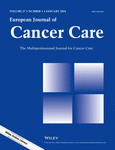Implementation of a pharmaceutical care programme for patients receiving new molecular-targeted agents in a clinical trial unit
Abstract
A pharmaceutical care programme was implemented at our hospital in early 2013. The main objectives were to analyse and describe the pharmaceutical interventions made, to calculate adherence, interventions and to evaluate patient satisfaction with the care programme. We performed a single-centre descriptive and prospective intervention in cancer patients who received oral chemotherapy as part of a clinical trial in 2013. Eighty-three patients were included. Median age was 58 years (range, 31–80) and 42 patients (50.6%) were men. We recorded 23 interventions, 13 of which were associated with drug interactions. The mean percentage of adherence was 98.9%. The interview with the pharmacist was considered to be very important by 84.6% of the respondents. A total of 92.3% said that they would like to speak to the pharmacist at subsequent visits. The doubts detected during the visits enable us to conclude that the information patients receive with respect to their study medication is usually incomplete. An integrated pharmaceutical care programme for cancer patients participating in clinical trials with oral cytostatic drugs was successful in terms of adherence and patient satisfaction and makes it possible to guarantee the safety and effectiveness of treatment on an individual basis.




